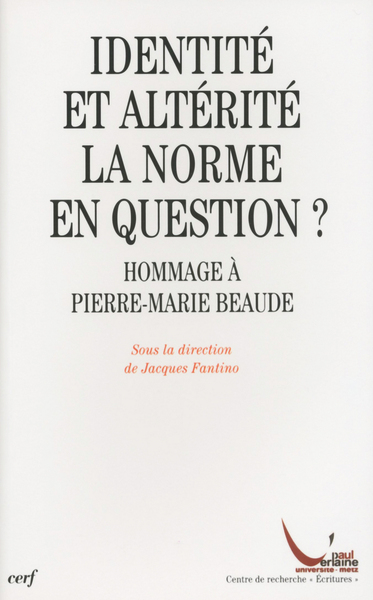- EAN13
- 9782204090834
- Éditeur
- Cerf
- Date de publication
- 9 avril 2010
- Collection
- SCHUM ET RELIGI
- Nombre de pages
- 324
- Dimensions
- 23,5 x 14,5 x 2,7 cm
- Poids
- 508 g
- Langue
- fre
Identité Et Altérité : La Norme En Question ?, Hommage À Pierre-Marie Beaude
Jacques Fantino
Cerf
Prix public : 37,40 €
L'ouvrage pose la question de l'identité, et donc de l'altérité, au sein de la société. On ne peut vivre sans identité. En même temps, l'identité se construit par la confrontation à l'autre. Or, la société est marquée aujourd'hui par un fort brassage des cultures et des religions et, par conséquent, des identités. Saisir l'identité est devenu de ce fait beaucoup plus difficile. En effet, elle n'est jamais purement personnelle, mais se construit aussi en référence à une collectivité, voire à plusieurs. De plus, la question de l'identité individuelle et culturelle se trouve associée à celle des minorités au sein de la société. Historiquement, on constate, en Occident, un déplacement de la problématique des minorités et, donc, de la notion d'identité. L'identité s'est définie au début de la modernité (du XVIe au XVIIIe siècle) par le religieux, l'appartenance culturelle ou ethnique n'intervenant qu'en second. Par la suite, le culturel ou l'ethnique est passé au premier plan, le religieux figurant au second. L'ouvrage reprend ces deux problématiques selon diverses approches : historiques, théologiques, philosophiques et littéraires, au début de la période moderne (XVIe au XVIIIe siècle) et dans le monde contemporain (XXe siècle). En contrepoint des interventions centrées sur la période moderne (du XVIe au XXe siècle), les deux dernières contributions reprennent la question à partir de l'Antiquité judéo-chrétienne. Elles montrent comment, dans un contexte différent, la problématique de l'identité et de l'altérité met en œuvre là aussi une reconstruction permanente. -- This book discusses the question of identity, hence of otherness, within our society. No one can exist without identity. But it is also true that identity is constructed by confrontation with the other. Today's society is characterized by a strong blending of cultures and religions and so of identities. It has consequently become much more difficult to grasp. Indeed, identity is never entirely personal, rather constructed in reference to a community, even several. Moreover, the question of individual and cultural identity is associated with that of minorities in our societies. Historically, in the West, we have observed a shift in the problematic of minorities and as a result, in the notion of identity. Identity was defined at the beginning of modernity (16th to 18th centuries) by religion; cultural or ethnic belonging playing a second role. After that, cultural and ethnic considerations came to the fore, the religious taking second place. This book studies the problematic from different angles: historical, theological, philosophical and literary, at the beginning of the modern era (16th to 18th centuries) and in the contemporary world (20th century). In counterpoint to the contributions focusing on the modern period (16th to 20th century), the last two contributions look at the issue in Judeo-Christian Antiquity. They show how, in a different context, the problematic of identity and otherness also established a permanent reconstruction.


















